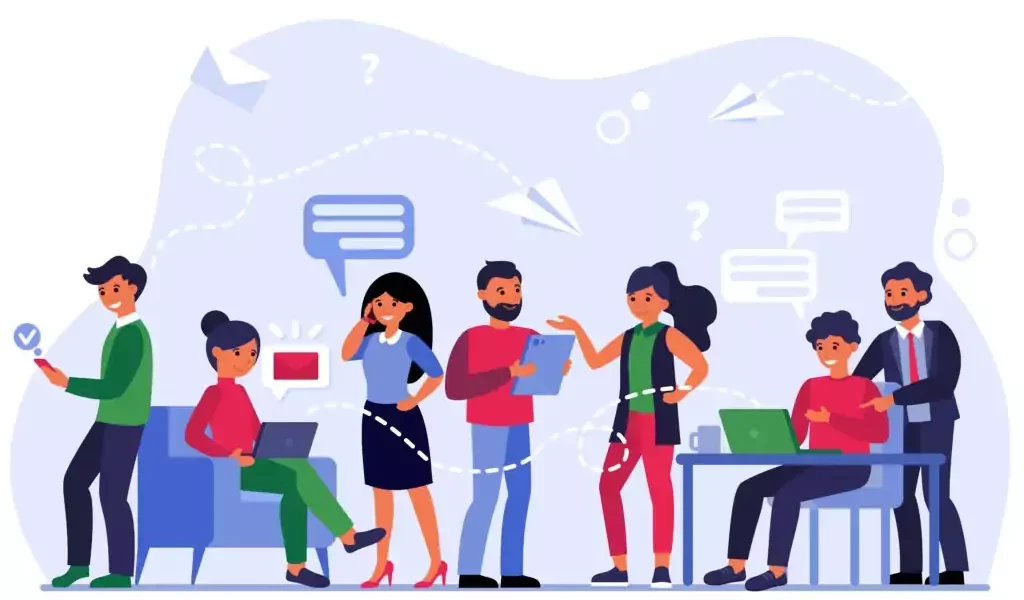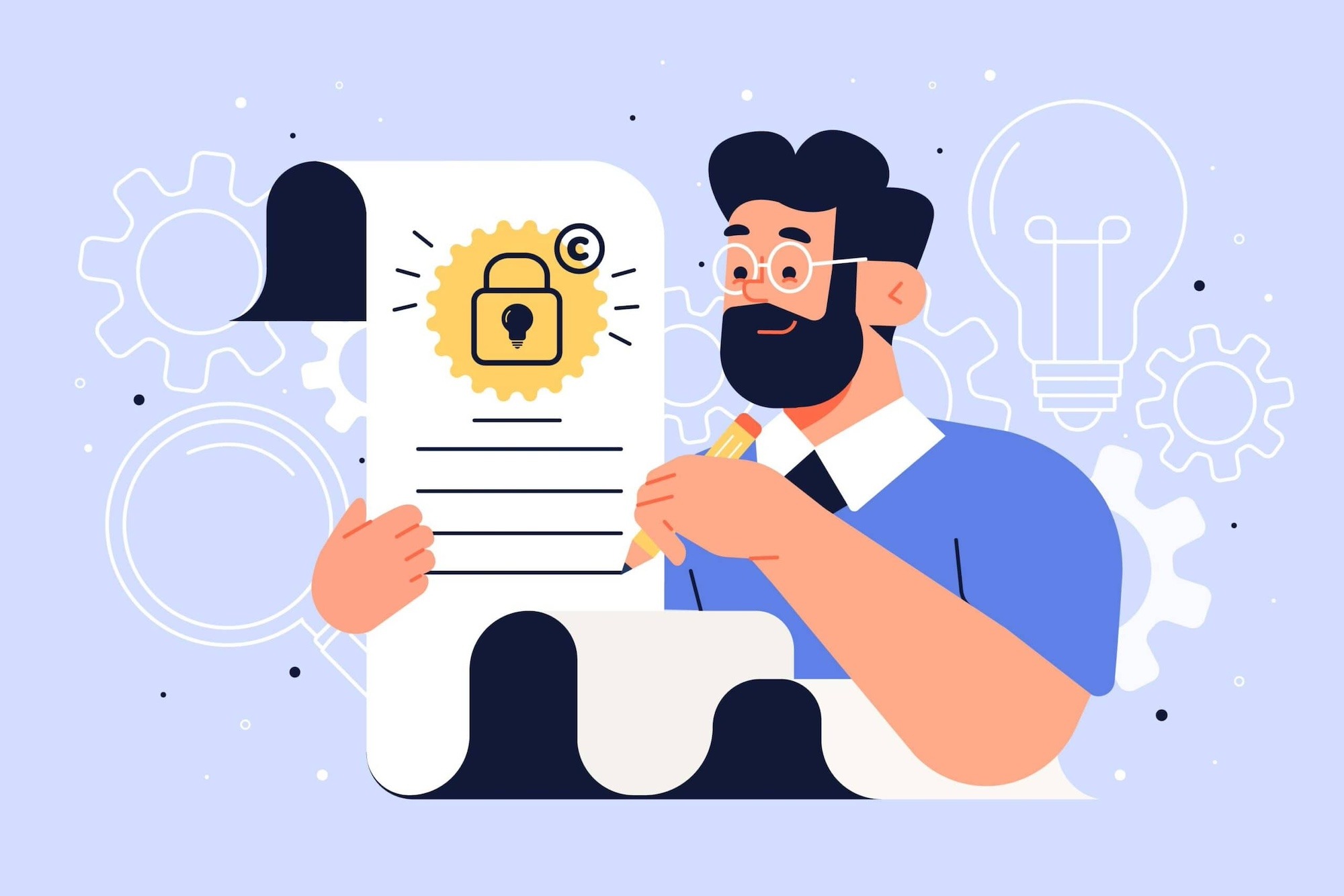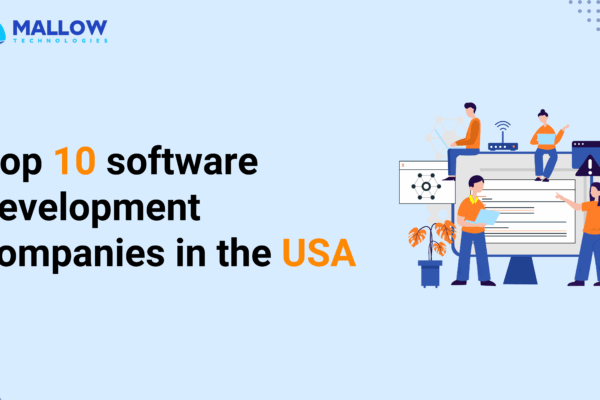In today’s digital age, intellectual property (IP) has become a valuable asset for businesses, especially when it comes to software and application development. As organisations collaborate with external teams to bring their innovative ideas to life, protecting their IP rights becomes essential. With the rapid evolution of technology and the ease of sharing information, safeguarding your intellectual property can be a complex task.
At Mallow, we prioritise transparency and open communication, reflecting our core values. Being a custom software development company in the field for more than a decade, we believe in cultivating an environment of collaboration where trust is nurtured, and our clients can flourish. Respecting the importance of intellectual property, we create a space that values and safeguards your innovative ideas.
After reading this article, you can understand how owning an IP can help you mitigate risks, ultimately safeguarding your valuable innovations and investments.
What is Intellectual property (IP)?
Intellectual property (IP) plays a vital role in software development, where innovation and creativity thrive. In this digital age, protecting your software-based inventions, ideas, and investments is crucial for maintaining a competitive advantage and reaping the rewards of your hard work.
Patent filings worldwide grew by 1.7% in 2022. Trademark and industrial design filing activity dropped by 14.5% and 2.1%, respectively. Patent filings around the world reached 3.46 million, trademark filing activity dropped to 15.5 million, and industrial design filing activity reduced to just under 1.5 million. Applications for utility models – a special form of patent right – grew by 2.9% to 3 million applications. (Source: WIPO)
Understanding IP enables application owners to protect their innovative ideas and technologies through patents. Patents provide exclusive rights to inventors, granting them the power to prevent others from making, using, or selling their inventions without permission. By obtaining a patent for a novel feature or functionality within their application, owners can establish a strong market position, attract investors, and prevent competitors from copying or exploiting their innovation.

For example, a food delivery company invents a unique algorithm that revolutionises online food delivery by optimising delivery routes in real time. By obtaining a patent for this innovation, the company gains exclusive rights, ensuring competitors cannot replicate the algorithm and enabling them to establish a dominant market position in the industry.
Trademarks play a vital role in protecting the brand identity and reputation of an application. A trademark is a distinctive sign, such as a name, logo, or slogan, that distinguishes a product or service from others in the market. By registering a trademark, a company can prevent others from using similar names or logos, which could create confusion among consumers. This not only safeguards their brand’s goodwill but also helps in building customer loyalty and trust.
For instance, let us consider a popular food delivery company that registers its logo and name as its trademarks. This ensures that no other similar service can use a similar logo or name, protecting the company’s brand identity. Ultimately, customers can easily recognise and trust the company’s application, leading to increased user loyalty and a strong market position.
Furthermore, copyrights are essential for protecting the original creative content of an application. Whether it’s the code, user interface, graphics, or multimedia elements, copyrights grant exclusive rights to the creator, preventing unauthorised reproduction, distribution, or modification of their work. Understanding copyright law enables application owners to enforce their rights and take appropriate actions against infringement, ensuring their unique expression remains protected.
Interested in knowing more about how to secure your IP? Check out this article in Medium on the ways you can adopt to secure your IP.
Trade secrets, such as proprietary algorithms or business methods, are valuable assets for application owners. Trade secrets provide a competitive advantage by offering unique insights or techniques that are not known to others. By implementing proper security measures and confidentiality agreements, application owners can safeguard their trade secrets and prevent unauthorised disclosure or use by employees, partners, or competitors.
What are some other IP-related considerations to discuss with your application development team?
Open Source Software
When incorporating open-source software into an application, it’s important to understand the specific licences governing the software. Different open-source licences have varying requirements and restrictions, such as providing attribution or releasing modifications under the same licence.
Suppose you are developing a web application and decide to use a popular open-source JavaScript library called jQuery to simplify your development process. jQuery is released under the MIT licence, which is a permissive open-source license.The MIT licence allows you to freely use, modify, and distribute the jQuery library, even in commercial applications, without imposing many restrictions. However, it does require you to include the original copyright notice and permission notice in all copies or substantial portions of the software.In this scenario, you would need to ensure that your web application includes the appropriate attribution to the jQuery library by including the copyright notice and permission notice in the relevant files or documentation. This ensures compliance with the MIT licence terms.
Licensing and Distribution
For commercial applications, developers may choose to licence their software to third parties or distribute it through various channels. Understanding licensing agreements, royalty structures, and distribution rights is crucial in protecting IP and ensuring proper compensation for the use of the software.
International IP Protection
Intellectual property protection extends beyond national borders. Considering international IP laws and seeking appropriate protections, such as patents or trademarks, in different countries may be necessary, especially if the application has a global reach or target audience.
Enforcement and Litigation
In cases of IP infringement, developers may need to enforce their rights through legal means. This can involve litigation, cease and desist letters, negotiation, or seeking settlements. Understanding the legal options available and working with intellectual property attorneys can help protect and defend IP assets effectively.
Why should I own the IP of my application?
1. Legal protection

When you own the IP rights, you have legal protection against unauthorised use, reproduction, distribution, or modification of your software. It allows you to enforce your rights and take legal action against any infringement or misuse of your application.
2. Commercial value
Owning the IP gives you the ability to monetise your software application. You can licence it to others, sell it, or use it as a core asset for your business. By retaining the IP, you have control over how your software is used and can negotiate favourable deals with partners or investors.
3. Competitive advantage
In today’s technology-driven world, innovation is key to staying ahead of the competition. By owning the IP, you have exclusive rights to your software’s unique features and functionalities. It prevents others from copying or replicating your ideas, giving you a competitive edge in the market.
For example, let’s consider a social media platform that devises a one-of-a-kind algorithm for personalised content recommendations. By securing a patent for this algorithm, they effectively prevent competitors from copying their technology. As a result, they gain a competitive edge and are able to attract a larger user base to their platform.
4. Future growth and expansion
As your software application evolves, owning the IP allows you to adapt, enhance, and expand it as needed. You can release updates, create new versions, or integrate it with other technologies without any restrictions or dependencies on third parties.

People communicating via social media flat vector illustration. Business team using mobile phones, laptops, tablets for networking and chatting. Digital technology and conversation concept
Let us consider a software company that owns the IP for a cloud-based project management application. They continuously enhance and release updates to meet evolving customer needs. Having full control over their IP enables them to adapt and expand the software without relying on third parties.
5. Brand protection
IP ownership includes protecting your software application’s name, logo, and branding elements. By owning these rights, you can safeguard your brand’s reputation and prevent others from using similar branding that may confuse customers or dilute your market presence.
For example, let us consider a software startup registering a trademark for its logo and name. This protects their brand identity and reputation from being exploited or confused with similar competitors. It allows them to establish a strong market presence and maintain customer loyalty.
6. Partnership and investment opportunities
Investors and potential partners often look for assurances that the IP of a software application is properly protected and owned by the entity they are considering working with. Owning the IP enhances your credibility, making it easier to attract investors, secure partnerships, or enter licensing agreements.
Let us assume a healthcare tech company secures several patents for their innovative telemedicine platform. This ownership of IP enhances their credibility and attracts potential investors and strategic partners who value the protected technology. It opens doors for collaborations, investments, and licensing agreements.
7. To ensure complete ownership
Lack of ownership and control over your application can also present challenges when it comes to exit strategies. For example, if you decide to sell your application or merge with another company, owning the IP provides a valuable asset. Potential acquirers or partners may be more interested in acquiring a product with IP rights, as it provides a competitive advantage and long-term value.
8. Protect yourself from vulnerability to competitors
Without proper knowledge of their IP, business owners cannot protect their innovative ideas, technologies, or unique features from being copied or replicated by others. Competitors can exploit this lack of IP protection and potentially create similar applications that imitate or surpass the original. This puts the application owners at a disadvantage in terms of market differentiation and may result in a loss of market share, customer trust, and potential revenue.
How can IP be effectively managed when working with an outsourced application development team?
Managing intellectual property (IP) with application development companies typically involves establishing clear agreements and contracts that outline the ownership and rights of the IP involved in the development process. The IP agreement could include a mention of the Intellectual Property, Moral Rights, confidentiality, term and termination, Infringement and Dispute Resolution, Governing Law and Jurisdiction, the date from which the agreement would turn effective, and other details about the works and services you want to be a part of your IP agreement.
Non-disclosure agreements (NDAs) are often employed to protect confidential information during the development process. It is crucial to conduct due diligence and ensure that the application development company respects copyright laws and does not infringe on the IP rights of others.
Effective IP management helps protect the interests of all parties involved and facilitates a successful collaboration in the realm of application development.
What are some typical steps to be taken for owning the IP?
Take the necessary steps to protect your software application by registering for copyrights, and trademarks, or patents, depending on the nature of your IP. Safeguarding your IP can provide legal recourse in case of infringement or unauthorised use. Below mentioned is a checklist that will turn out handy for you when you initiate the process of IP-related works for your application.
- Conduct a thorough IP audit. Assess all aspects of your application, including software code, algorithms, designs, branding elements, and trade secrets. Identify the intellectual property that needs protection.
- Research existing IP. Conduct comprehensive searches to ensure your application does not infringe upon existing patents, trademarks, or copyrights. This minimises the risk of legal conflicts and allows you to make necessary adjustments if any conflicts arise.
- File for patents. Identify novel and inventive aspects of your application and file for patents to protect them. Work with a qualified patent attorney to navigate the complex patent application process.
- Register trademarks. Register your application’s name, logo, and branding elements as trademarks to prevent others from using similar marks that may cause confusion in the market. Consult with a trademark attorney to ensure proper registration and enforcement.
- Secure copyrights. Apply for copyrights to protect your application’s source code, graphics, and other creative elements. Although copyright protection exists automatically, formal registration strengthens your legal position in case of infringement.
- Implement confidentiality measures. Safeguard trade secrets and confidential information by implementing non-disclosure agreements (NDAs) with employees, contractors, and partners. This ensures that valuable information remains protected.
- Draft robust contracts. Use well-drafted contracts, such as software development agreements and licensing agreements, to clearly define ownership rights, usage permissions, and restrictions related to your application. Seek legal counsel to draft or review these contracts.
- Monitor and enforce your IP rights. Regularly monitor the market for potential infringement. Actively enforce your IP rights by sending cease and desist letters, pursuing legal actions if necessary, and keeping records of your enforcement efforts.
- Educate your team. Train your employees and stakeholders about the importance of IP protection and the proper handling of sensitive information. Foster a culture that values and respects intellectual property rights.
- Stay updated. Stay informed about changes in IP laws and regulations that may impact your application’s protection. Regularly review and update your IP strategy to adapt to emerging challenges and opportunities.
Still, wondering where you need to take the next step? Get in touch with our team.
Your queries, our answers
IT outsourcing refers to hiring a third-party service provider to handle software development tasks, allowing businesses to access external talent and resources for specific projects or ongoing development needs.
- A team of developers is assigned exclusively to your project, providing specialized expertise and full focus on your needs.
- It offers high flexibility, full commitment, and alignment with your project goals.
- Outsourcing for specific projects with clear deliverables, timelines, and objectives, based on a fixed scope.
- It provides a defined project scope and milestones, effective use of resources, and focused expertise.
- Supplementing your in-house team with external IT experts to fill skill gaps or increase capacity for specific tasks or projects.
- It gives immediate access to specialized skills, increased flexibility, and enhanced project capabilities without long-term commitment.
- Onshore: Outsourcing to a company in your home country.
- Offshore: Outsourcing to a company in a distant country, often for cost savings.
- Nearshore: Outsourcing to a neighboring or nearby country, offering similar time zones and easier communication.
Mallow offers a blend of technical expertise, proven methodologies, and flexible engagement models to deliver high-quality software solutions tailored to your needs, with a strong focus on communication and project management.
Common risks include:
- Communication barriers (especially in offshore outsourcing)
- Time zone differences
- Potential quality issues
- Data security and confidentiality concerns.
These risks can be mitigated by choosing the right partner and implementing clear communication and security protocols.
To explore these risks in detail and discover strategies for effective mitigation, consider seeking additional insights on managing challenges in outsourcing.
If you choose software development outsourcing, you will have the following benefits:
- Access to a diverse global talent pool
- Significant cost reduction
- Accelerated time-to-market
- Ability to concentrate on core business functions
- Increased scalability and adaptability
To learn more about these benefits and how they can impact your business strategy, check out our detailed insights.
Choosing the right outsourcing partner is a critical decision that can significantly impact the success of your project. To ensure you make an informed choice, consider the following key factors:
- Experience and portfolio
- Technical expertise and industry knowledge
- Client references and reviews
- Communication and collaboration processes
- Security measures and data protection policies
- Cost structure and flexibility
Check out our article to explore these factors in detail and understand the steps to effectively select your ideal development team.
Getting started with mallow involves 3 simple steps :
- Contact us with your project requirements
- We will discuss your needs, provide a proposal, and define the scope of work
- Once the contract is signed, we’ll kick off the project with a dedicated team
We ensure transparency through:
- Detailed project plans and timelines
- Clear communication channels
- Regular reporting and progress updates
- Access to project management tools and dashboards
Mallow ensures effective communication and collaboration across different time zones through:
- Structured Communication: Utilizing clear channels like regular video meetings, emails, and project management tools to keep all stakeholders informed and engaged.
- Flexible Scheduling: Arranging meetings and updates at times convenient for all parties, ensuring overlap for real-time discussions.
- Comprehensive Documentation: Providing detailed project documentation and status reports to ensure everyone is aligned, regardless of time zone.
- Dedicated Points of Contact: Assigning project managers and team leads to facilitate seamless communication and address any issues promptly.
Author
SathishPrabhu
Sathish is an accomplished Project Manager at Mallow, leveraging his exceptional business analysis skills to drive success. With over 8 years of experience in the field, he brings a wealth of expertise to his role, consistently delivering outstanding results. Known for his meticulous attention to detail and strategic thinking, Sathish has successfully spearheaded numerous projects, ensuring timely completion and exceeding client expectations. Outside of work, he cherishes his time with family, often seen embarking on exciting travels together.



